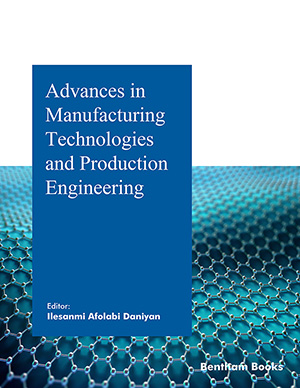Abstract
Background: Nutation face gear transmission is a patent about a new type of transmission based on meshing between two face gears. It replaces spur gear with internal face gear to form a “faceface” meshing gear pair and actualizes its deceleration function by combining the nutation principle, which has the advantages of both face gear and nutation drive.
Objective: The purpose of this paper is to study the designing and manufacturing of a nutation face gear reducer to derive the force calculation formulas of the face gear, input shaft and bearings, calculate the contact stress of tooth surface and bending stress of tooth root, determine the basic parameters of the prototype, and analyze the processing points for the core parts of the prototype.
Methods: Using the dynamic meshing force analysis method by combining it with modern digital design and manufacturing methods, the designing and manufacturing of a nutation face gear reducer are studied.
Results: In the theoretical calculation, the maximum contact stress of the fixed side tooth surface is about 433MPa, and the average contact stress is about 345MPa; the maximum contact stress of the tooth surface on the rotating side is about 579MPa, with an average of about 502MPa; the comparison of which with the finite element analysis results verifies the theoretical calculation results.
Conclusion: The dynamic meshing force analysis method of nutation face gear transmission is deduced and given. Based on this, gear tooth surface transient contact stress and tooth root bending stress are calculated.
Keywords: Face gear, Finite element analysis (FEA), Force calculation, Nutation drive, Prototype.
[http://dx.doi.org/10.1299/kikaic.72.1200]
[http://dx.doi.org/10.1299/kikaic.72.1194]
[http://dx.doi.org/10.1299/kikaic.73.1731]
[http://dx.doi.org/10.1299/kikaic.73.1188]
[http://dx.doi.org/10.1007/s12206-009-1157-y]
[http://dx.doi.org/10.1177/0954406212457644]
[http://dx.doi.org/10.1243/0954410971532488]
[http://dx.doi.org/10.1115/1.1814392]
[http://dx.doi.org/10.1016/S0045-7825(97)00229-6]
[http://dx.doi.org/10.1016/S0094-114X(01)00086-6]
[http://dx.doi.org/10.1016/j.mechmachtheory.2005.03.001]
[http://dx.doi.org/10.1016/j.procir.2015.06.103]
[http://dx.doi.org/10.1007/s10010-017-0245-x]
[http://dx.doi.org/10.1080/15397734.2015.1047956]
[http://dx.doi.org/10.1007/s00521-015-2110-x]
[http://dx.doi.org/10.1007/s00500-020-04687-0]
[http://dx.doi.org/10.2174/2212797613999200420161031]
[http://dx.doi.org/10.1108/EC-11-2019-0522]
[http://dx.doi.org/10.1243/PIME_PROC_1994_208_262_02]
[http://dx.doi.org/10.1016/S0045-7825(01)00201-8]
[http://dx.doi.org/10.1016/S0045-7825(02)00215-3]
[http://dx.doi.org/10.1016/S0094-114X(02)00050-2]
[http://dx.doi.org/10.1016/j.cma.2004.09.006]
[http://dx.doi.org/10.1016/j.mechmachtheory.2019.103576]
[http://dx.doi.org/10.1016/j.mechmachtheory.2012.10.007]



















